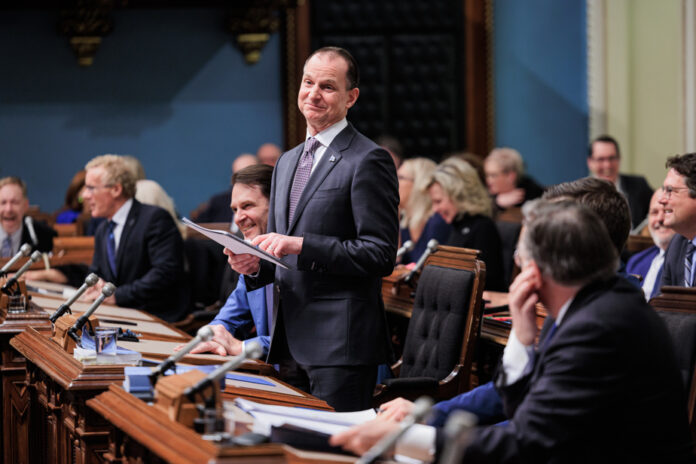Nearly 20% of Quebec’s culture budget will go to Télé-Québec, which will receive $101 million over the next five years to “reaffirm its role in youth and cultural programming.” The government will also widely promote digital cultural content.
The Minister of Culture and Communications, Mathieu Lacombe, had already expressed his commitment to the next generation and the importance for young people of being introduced to Quebec culture from an early age. With the measures put forward in the new budget tabled on Tuesday, he is moving from words to action.
Out of a total budget of 561 million by 2027-2028, Télé-Québec will receive an envelope of 101 million over the next five years to “propose an original and renewed offer”. Télé-Québec President and CEO Marie Collin said she was pleased with the announcement, which comes “after several years of representations”.
Concretely, Ms. Collin would like to retain young people aged 9 to 14, by picking them up “where they are”. In particular, she intends to create “short content” on social networks, to tickle them just enough to lead them to longer content.
“What we have to do is create volume,” continues Marie Collin. We have to create a lot of content in which young people will recognize themselves. We cannot bet on a Passe-Partout, we will need several Passe-Partouts for different age groups. To occupy the digital space. »
Ms. Collin estimates that the additional $20 million per year will largely go to independent producers, who will create this content.
The government is also encouraging the next generation of musicians and the performing arts by investing $16.8 million over five years in the Conservatoire de musique et d’art dramatique du Québec. Thanks to this aid, the Conservatory will notably be able to accommodate “1000 music students per year”, can we read in the budget document.
Another government objective is to promote cultural content on digital platforms. Québec will invest $95 million in this sector, in particular to support businesses in the digital creativity sector, ensure an online presence for Québec cultural content and promote culture in foreign markets.
A digital cultural passport will also be made available to young people to put them in direct contact with Quebec’s cultural offerings. A sum of 4.2 million over two years will be invested to allow them to have access to “cultural goods and services” at a minimum cost.
Aid to the media sector is also planned, we are talking about 13.3 million over the next five years.
Quebec is also giving a boost to the book industry, “which is facing a 30% increase in its production costs,” reads the budget plan. Publishers will receive a 35% tax credit (up from 7%) and can deduct 65% of their labor expenses “for digital preparation and publishing costs” .
In total, we are talking about aid of 5.5 million over five years intended for around 90 publishing houses.
Finally, the promotion and enhancement of the French language are also among the priorities of the government, which intends to invest 88 million, increasing the total budget reserved for culture and the French language to 649 million.
Tuesday evening, the living arts community was still dissecting Eric Girard’s budget and increasing calls to find out more concretely how the government was going to continue to support them.
One thing is certain, the ticketing assistance put in place in the fall of 2020 to compensate for the loss of revenue due to Public Health directives during the pandemic (by reimbursing up to 75% of ticketing revenue) will be phased out over a period of three years, according to our information.
“The government is more in transition mode than in recovery mode,” notes David Laferrière, general manager of Théâtre Gilles-Vigneault and president of RIDEAU, which brings together 350 performance halls in Quebec. “Honestly, it is not clear how the government will support us. »
A briefing with the performing arts sector is scheduled for Wednesday with the cabinet of the Ministry of Culture and Communications precisely to take stock of the various measures concerning them.
“It is sure that we, what we have been asking for a long time, is more predictability, continues David Laferrière. For example, we would have liked the amounts granted by the Department last year to alleviate the labor shortage to be renewed, which does not seem to be the case. »
For his part, Patrick Kearney, artistic director of the Santa Teresa festival and president of the Grouping of independent regional artistic festivals (REFRAIN), said he was happy to know that the Festival / Event program of the Ministry of Tourism was going to be renewed – we are talking about 30 million per year for the next three years.
On the other hand, he says he is worried to see federal aid dry up, Canadian Heritage having hinted that it would end its aid programs for the past three years. We will know more when the federal budget is tabled on March 28.
Finally, there is no mention of the Blue Spaces project, these cultural places which must be set up in heritage buildings in all the administrative regions of Quebec.
The initial sum that the government was to invest for the 18 projects was 259 million, but an investigation by the daily Le Soleil revealed that a sum of 153 million would be necessary to develop only four of these places. It is therefore expected that the budget devoted to Blue Spaces will be revised upwards.
Finally, the government has announced that the role of the Cultural Business Development Corporation (SODEC) will be increased. A sum of 200 million will be paid to him to play his new role. A detailed announcement from Minister Lacombe will be made shortly.















